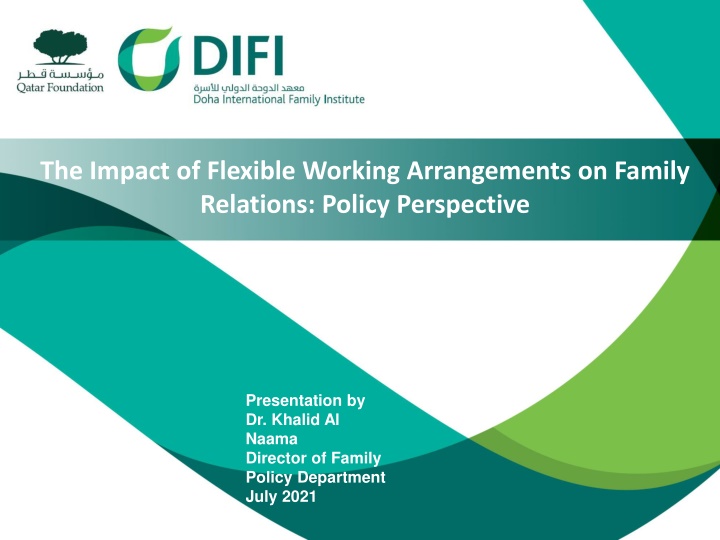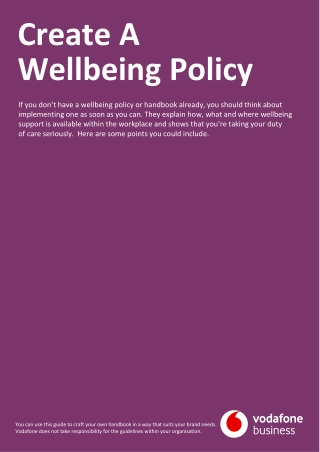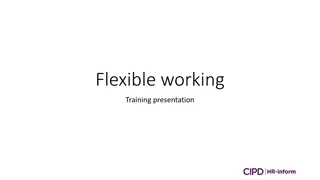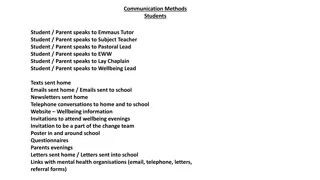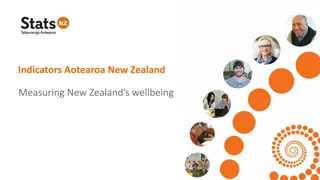Enhancing Family Wellbeing Through Flexible Working Policies: An In-Depth Analysis
This presentation by Dr. Khalid Al Naama explores the impact of flexible working arrangements on family relations from a policy perspective. It delves into the various types of flexible working arrangements, their benefits for both parents and employers, and the challenges faced in achieving a better work-family balance. The discussion highlights the importance of implementing family-friendly policies, such as flexible schedules, parental leaves, and remote work options, to support working parents and improve overall family wellbeing. Recommendations include adopting flexible work policies to reduce job pressure, enhance employee performance, and mitigate stress related to balancing work and family responsibilities.
Download Presentation

Please find below an Image/Link to download the presentation.
The content on the website is provided AS IS for your information and personal use only. It may not be sold, licensed, or shared on other websites without obtaining consent from the author.If you encounter any issues during the download, it is possible that the publisher has removed the file from their server.
You are allowed to download the files provided on this website for personal or commercial use, subject to the condition that they are used lawfully. All files are the property of their respective owners.
The content on the website is provided AS IS for your information and personal use only. It may not be sold, licensed, or shared on other websites without obtaining consent from the author.
E N D
Presentation Transcript
The Impact of Flexible Working Arrangements on Family Relations: Policy Perspective Presentation by Dr. Khalid Al Naama Director of Family Policy Department July 2021
Framing Flexible Working Arrangements in Policy Context FWAs are part of family- friendly policies , which refer to policies that help Discussion in this domain is shaped by four main policy areas Presentation by Dr. Khalid Al Naama Director of Family Policy Department March 2021 working parents to reconcile work and family life Childcare and access to childcare The length of working hours Parental paid leaves Employee- centered flexibility
TYPES OF FLEXIBLE WORKING ARRANGMENTS Parental leaves (Maternity/paternity leaves) Flexibility in Career Breaks Emergency leave Care leave Flexi- time (Ex. can be used to take children to schools) Flexibility in Scheduling Presentation by Dr. Khalid Al Naama Director of Family Policy Department March 2021 Flexibility in Location Annualized hours Compressed hours Working from home or Tele- homeworking Hot-desking Mobile working Part-time Flexibility in Work s Length Job sharing Overtime
BENEFITS OF FLEXIBLE WORKING ARRANGMENTS Reduces job pressure & enhance parents and family members wellbeing Enables parents to cater for the needs of their children and vulnerable family member in their household, while still building on their career. Keeps first-time parents fulfilled in their goals as they ease their way back into the workplace. Better employee performance as a result of reducing job pressure Presentation by Dr. Khalid Al Naama Director of Family Policy Department March 2021 For working parents Reduces rates of staff turnover and absenteeism Assists in recruiting and retaining staff Attracts talented prospective applicants For employers
DIFIs Policy-oriented Research Work- Family Balance: Challenges, Experience The cost of the financial wherewithal was work hours and a psychological toll characterized as long and exhausting which left workers with insufficient time and energy for the family. Presentation by Dr. Khalid Al Naama Director of Family Policy Department March 2021 s and Implication s for Families in Qatar Working conditions which entail long working hours and inadequate annual leave entitlements jeopardize the ability of parents to balance work and family responsibilities. Stress causes mental and physical problems that negatively influence on parents wellbeing and impacts productivity as well. DIFI recommends adoption of flexible working arrangements, as part of package WFB s and is stiving to reach this goal through outreach and advocacy.
Qatar Foundations Family Friendly Policies QF undertook number of important policy review that geared towards ensuring good family-work balance for QF s employees. In July 2017 QF extended maternity leave to 14 weeks with full pay and extended also the nursing hours to 2 hours for one year from the time she resumes duty from the leave. QF extended paternity leave to 5 working days. In July 2018 QF adopted flexible hours policy stating that other than the normal working hours Presentation by Dr. Khalid Al Naama Director of Family Policy Department March 2021 within the Foundation (7:30AM 3:30PM). QF applied a part time policy which provides an opportunity for employees work under a part-time contract, where hours range from 19 to 25 hours per week, providing further flexibility.
DIFIs Policy-oriented Research Flexible work practices, as part of family policy packages, have been, as well, beneficial for countries which suffer from declining population Working conditions that involve long working hours, the expectation that work will be done outside normal working hours, the short entitlement to annual leave, and the failure to provide family leave when the child is sick, make it difficult for working parents to balance work and family responsibilities Social Aspects Presentation by Dr. Khalid Al Naama Director of Family Policy Department March 2021 of Fertility Working women in countries where such conditions prevail are reluctant to bear children, as society expects the mother (even if she is working) to play these roles instead of the father, or without his participation Countries that applied flexible work schedules amongst other measures, made it possible for working mothers to have more children; as it enabled them to reconciliate between their job duties and childbearing and child-rearing
DIFIs Policy-oriented Research Parents work impacts bonding with their children, as it represents the external ecosystem in which the child lives but does not interact with him/her directly, yet affecting the child growth The involvement of Parents in Commuting their children to Presentation by Dr. Khalid Al Naama Director of Family Policy Department March 2021 school: Challenges and Policy Implications Children are exposed to abuse by their drivers and nannies during commuting to school. Involvement of parents in commuting their child to school contribute to child protection efforts Non-Qatari respondents have the highest percentage of those who do not take their children to school, at 67%, whereas 70% of the Qatari sample do deliver sometimes Lack of flexible policies in the parents workplaces is one of the most important reasons that prevent parents from delivering their children, and thus affects the child s growth and development
DIFIs Policy-oriented Research In the three countries of the Gulf, women have managed to achieve remarkable progress especially in educational attainment, yet such achievements were not matched by an equivalent level of participation in the labor market COMPARATIVE ANALYSIS OF GENDER EQUALITY IN SOCIAL Presentation by Dr. Khalid Al Naama Director of Family Policy Department March 2021 WELFARE IN QATAR, KUWAIT AND OMAN Lack of policies contributing to attainment of family-work balance is one of underrepresentation of women in labor force the factors impacting Adoption of family friendly policies which include flexible work arrangements will contribute to increase women s participation in the labor force and achieve gender equality outcomes
DIFIs Policy-oriented Research DIFI is currently engaged in impact assessment project that seek to analyze costs and benefits FWAs and other work-family policies introduced by QF to support reconciliation of work -family duties of its employees Cost - Benefit Analysis on Work- Presentation by Dr. Khalid Al Naama Director of Family Policy Department March 2021 family Balance Project As part of a wider WFB policies, QF adopted flexible hours policy stating that other than the normal working hours within the Foundation (7:30AM 3:30PM), and applied a part time policy which provides an opportunity for employees work under a part-time contract, where hours range from 19 to 25 hours per week, providing further flexibility This study will validate benefits of FWAs (and other FWB policies) through provision of further evidence on benefits of Flexible working Arrangements and other measures of WLB undertaken by QF
CONCLUSION & WAY FORWARD Flexible Working Arrangements came out as one of the major policy recommendations for DIFI s policy-oriented studies. Population growth Child developm ent Gender equality It has been recommended to achieve outcomes of vital issues including the family cohesion, gender equality, population growth, child protection/development enhancement of relationship/quality time with children. Flexible working Arrange ments and better parents-child Family Cohesion Productivit y Going forward, DIFI intents to continue its effort on this policy area - project on Family Policies in the Workplace , is underway. Parenting
THANK YOU CONTACT US Tel : +974 4454 8220 Fax : +974 4454 8249 PO Box: 34080, Doha, Qatar Email: difi@qf.org.qa www.difi.org.qa
